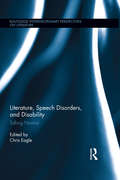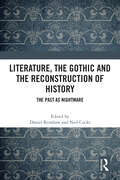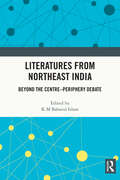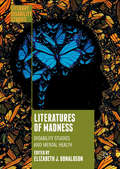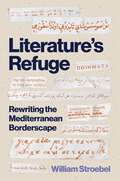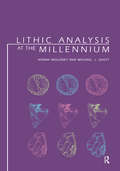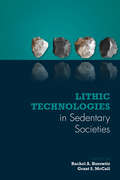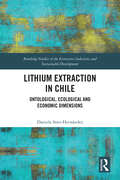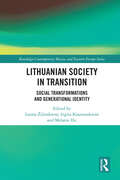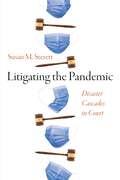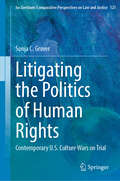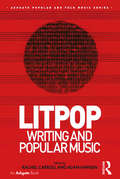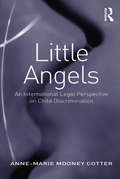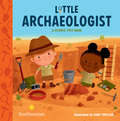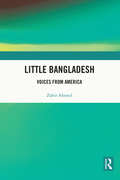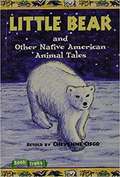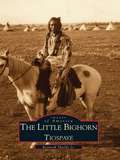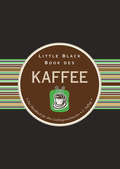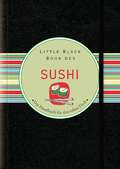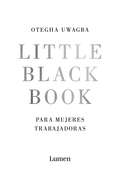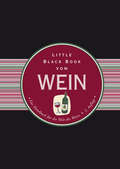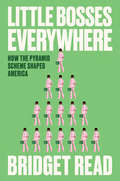- Table View
- List View
Literature, Speech Disorders, and Disability: Talking Normal (Routledge Interdisciplinary Perspectives on Literature)
by Chris EagleExamining representations of speech disorders in works of literature, this first collection of its kind founds a new multidisciplinary subfield related but not limited to the emerging fields of disability studies and medical humanities. The scope is wide-ranging both in terms of national literatures and historical periods considered, engaging with theoretical discussions in poststructuralism, disability studies, cultural studies, new historicism, gender studies, sociolinguistics, trauma studies, and medical humanities. The book’s main focus is on the development of an awareness of speech pathology in the literary imaginary from the late-eighteenth century to the present, studying the novel, drama, epic poetry, lyric poetry, autobiography and autopathography, and clinical case studies and guidebooks on speech therapy. The volume addresses a growing interest, both in popular culture and the humanities, regarding the portrayal of conditions such as stuttering, aphasia and mutism, along with the status of the self in relation to those conditions. Since speech pathologies are neither illnesses nor outwardly physical disabilities, critical studies of their representation have tended to occupy a liminal position in relation to other discourses such as literary and cultural theory, and even disability studies. One of the primary aims of this collection is to address this marginalization, and to position a cultural criticism of speech pathology within literary studies.
Literature, the Gothic and the Reconstruction of History: The Past as Nightmare
by Neil Cocks Daniel Renshaw AndIn the Gothic, nothing stays buried for long. Since its inception in the mid-eighteenth century, the Gothic imagination has been concerned with the pasts of the societies from which it emerged. This collection, featuring contributions from archivists, historians and literary critics, examines how horror fiction and the wider Gothic mode have engaged with the constructed conception of "history".From Victorian nightmares of Jurassic jungles to ghost stories on the contemporary stage, the contributors adopt varied and innovative approaches to consider how the Gothic has created, complicated and sometimes subverted historical narratives. In doing so, these works blur the distinctions between the "historical record" and creative endeavour, undermine linear and sequential understandings of the progress of time and dissolve temporal boundaries. The collection explores a variety of Gothic forms including drama, poetry, prose, illustration, film and folklore, and it draws on classic texts such as Wuthering Heights and Dracula, as well as less familiar works, including Reynolds’ The Mysteries of London and Baldini’s Mal’aria.Literature, the Gothic and the Reconstruction of History will be invaluable to students and scholars interested in the confluences of literary and historical endeavour, the creation and depiction of historical constructs in popular culture, and Gothic horror in its myriad forms.
Literatures from Northeast India: Beyond the Centre–Periphery Debate
by K M Baharul IslamThis book showcases the diverse literary traditions from India’s Northeast and their shared connections and lineages. It critically analyses a selection of literary works from authors and poets from this region and the hegemonies of language, ethnicity and politics that have framed these voices. A region with rich cultural and ethnolinguistic diversity, the literature from Northeast India is representative of varied histories, languages, socio-cultural and religious practices. The book highlights the distinct use of language, forms, cultural symbols and metaphors which articulates the unique experiences of conflict, beauty and culture in this area. Focussing on the translingual and transcultural aspects of these literary works it examines the dynamics between literature, language and their socio-cultural influences. The book pays attention to themes of representation, identity and power to showcase voices and perspectives of dissent, criticism and introspection. It explores contemporary critical approaches to literature from the Northeast, by re-examining the idea of the centre and the periphery and the position of subaltern literary voices. This book will be of interest to students and researchers of literature, language, cultural studies, postcolonial studies and South Asian studies.
Literatures of Madness: Disability Studies and Mental Health (Literary Disability Studies)
by Elizabeth J. DonaldsonLiteratures of Madness: Disability Studies and Mental Health brings together scholars working in disability studies, mad studies, feminist theory, Indigenous studies, postcolonial theory, Jewish literature, queer studies, American studies, trauma studies, and comics to create an intersectional community of scholarship in literary disability studies of mental health. The collection contains essays on canonical authors and lesser known and sometimes forgotten writers, including Sylvia Plath, Louisa May Alcott, Hannah Weiner, Mary Jane Ward, Michelle Cliff, Lee Maracle, Joanne Greenberg, Ann Bannon, Jerry Pinto, Persimmon Blackbridge, and others. The volume addresses the under-representation of madness and psychiatric disability in the field of disability studies, which traditionally focuses on physical disability, and explores the controversies and the common ground among disability studies, anti-psychiatric discourses, mad studies, graphic medicine, and health/medical humanities.
Literature’s Refuge: Rewriting the Mediterranean Borderscape
by William StroebelStories silenced or sequestered by a century of mass displacement between Europe and the Middle East—recovered and retold at lastIn 1923, the Greco-Turkish Population Exchange uprooted and swapped nearly two million Christians and Muslims, &“pacifying&” the so-called Near East through ethnic partition and refugeehood. This imposition of borders not only uprooted peoples from their place in the world; it also displaced many of their stories from a place in world literature. In Literature&’s Refuge, William Stroebel recovers and weaves together work by fugitive writers, oral storytellers, readers, copyists, editors, and translators dispersed by this massive &“unmixing&” of populations and the broader border logic that it set in motion. Stroebel argues that two complementary forces emerged as a template for the Eastern Mediterranean&’s cultural landscape: the modern border, which reshuffled people through a system of filters and checkpoints; and modern philology, which similarly reshuffled their words and works. Philologists and publishers defined modern literature by picking apart, extracting, reformatting, or dispossessing refugee and diasporic texts across a racialized borderscape—a gray zone of semi-inclusion and semi-exclusion, semimobility and immobility.Stroebel reaches into the chinks and crannies of this borderscape to reconstitute the rich textual geography between Greek Orthodoxy and Sunni Islam, between Greek-script, Arabic-script, and Latin-script literary traditions at the edges of Europe and the Middle East. Doing so, he offers a new methodological toolkit for rewriting the modern borderscapes of world literature.
Literatursoziologie: Zu ihrer Aktualität und ihren Möglichkeiten (Literatur und Gesellschaft. Literatursoziologische Studien)
by Christine Magerski Christian SteuerwaldDas Buch eröffnet die Reihe „Literatur und Gesellschaft“ und bietet mit seinen literatursoziologischen Studien einen vertieften Einblick in die aktuellen Themen und Paradigmen der deutschsprachigen Literatursoziologie. Die Beiträge reichen von der kritischen Lektüre fiktionaler, semifiktionaler und theoretischer Texten über die Erprobung neuer Perspektivierungen aus den Kultur-, Medien- und Kommunikationswissenschaften einschließlich der Digital Humanities bis hin zu ersten Entwürfen einer Soziologie der literarischen Bewertung und des Schauspiels sowie einer Literatursoziologie der technischen Existenzweise.
Lithic Analysis at the Millennium (UCL Institute of Archaeology Publications)
by Norah Moloney Michael J. ShottThe original research papers in the volume provide a broad review of current approaches to the study of lithic technology from the Palaeolithic to the present. The contributions address both with analytical techniques and interpretive issues. Collectively, they increase our understanding of issues such as tool function, means of production, raw material sourcing and exchange systems, and the evolution of human cognition, social organization and symbolic behavior.
Lithic Technological Systems and Evolutionary Theory
by Nathan Goodale William Andrefsky Jr.Stone tool analysis relies on a strong background in analytical and methodological techniques. However, lithic technological analysis has not been well integrated with a theoretically-informed approach to understanding how humans procured, made, and used stone tools. Evolutionary theory has great potential to fill this gap. This collection of essays brings together several different evolutionary perspectives to demonstrate how lithic technological systems are a byproduct of human behavior. The essays cover a range of topics, including human behavioral ecology, cultural transmission, phylogenetic analysis, risk management, macroevolution, dual inheritance theory, cladistics, central place foraging, costly signaling, selection, drift, and various applications of evolutionary ecology.
Lithic Technologies in Sedentary Societies
by Grant S. McCall John Whittaker Fumi Arakawa Mary A. Davis James Enloe Dan Healan Francesca Manclossi Theodore Marks Jayur Madhusudan Mehta Jason S. R. Paling Steve RosenLithic Technologies in SedentarySocieties examines lithic technology from ancient societies in Mesoamerica, the Near East, South Asia, and North America, showcasing the important contributions in-depth lithic analysis can make to the study of sedentary societies around the world. Using cutting-edge analytical techniques these case studies address difficult anthropological questions concerning economic, social, and political issues, as well as global trends in lithic production. Lithic analysis focused on sedentary societies, especially in places like Mesoamerica, has previously been neglected mostly because of the high frequency of informal tools, but such bias limits the ways in which both lithic production and economic organization are investigated. Bringing the importance of studying such technologies to the fore and emphasizing the vital anthropological questions that lithics can answer, Lithic Technologies in Sedentary Societies is a valuable resource for scholars and students of lithic technology and sedentary, complex societies. Contributors: Fumi Arakawa, Mary A. Davis, James Enloe, Dan Healan, Francesca Manclossi, Theodore Marks, Jayur Madhusudan Mehta, Jason S. R. Paling, Steve Rosen, John Whittaker
Lithics: Macroscopic Approaches to Analysis
by Jr William AndrefskyThis fully updated and revised edition of William Andrefsky Jr's ground-breaking manual on lithic analysis is designed for students and professional archaeologists. It explains the fundamental principles of the measurement, recording and analysis of stone tools and stone tool production debris. Introducing the reader to lithic raw materials, classification, terminology and key concepts, the volume comprehensively explores methods and techniques, presenting detailed case studies of lithic analysis from around the world. It also examines new emerging techniques and includes a new section on stone tool functional studies.
Lithium Extraction in Chile: Ontological, Ecological and Economic Dimensions (Routledge Studies of the Extractive Industries and Sustainable Development)
by Daniela Soto-HernándezThis book explores lithium extraction in Chile as part of the global energy transition, unravelling the ontological, ecological, and economic dimensions behind this type of extractivism.A transition away from fossil fuels is urgent in the context of climate change and one of the main challenges so far has been to store the variable energy provided by renewable energy sources. Due to its role in the lithium-ion batteries that power electric vehicles, lithium has been framed as a ‘critical mineral’ to transit towards low-carbon economies. Chile is the second lithium-exporting country worldwide and while it aims to expand its production, the delicate wetland ecosystems, and Indigenous territories where lithium comes from face increasing pressure. This book looks at the worlds, ecologies, and economies that are becoming increasingly extracted and the effects of these processes. Drawing on the case of extractivism in the Salar de Atacama watershed in the Antofagasta region in Chile and engaging with Indigenous and non-Indigenous local communities, NGOs, state officials, companies, and lithium workers through a twelve-month ethnography, the book offers a unique perspective into the contested narratives around what is being extracted and the manifold effects of it. By putting the Indigenous cosmovision forward and showing the local experiences with an industry powered by the ongoing energy transition, this book connects the notions of interconnection and fragmentation to provide a wider understanding of future challenges, where ontologies, ecologies, and economies are intertwined. The book weaves together different disciplinary strands and takes them forward to show how the solutions based on extractivism are menacing to destroy the marginalized worlds and ecosystems of human and non-human communities. As such, the book not only fills the gaps in current literature, but also goes further to rethink the ways in which academics engage with natural resources and how the pluriverse is currently experienced in the Salar de Atacama watershed.This book will be of great interest to academics, students, and environmental advocates studying energy transitions, critical minerals, anti-colonial and indigenous perspectives around development, and lithium extraction.
Lithuanian Society in Transition: Social Transformations and Generational Identity (Routledge Studies in the History of Russia and Eastern Europe)
by Melanie Ilic Laima Žilinskienė Sigita KraniauskienėLithuanian Society in Transition examines the life experiences formed during the process of post-socialist transformation in Lithuania by analysing the peculiarities of the life course of the cohort of young people born between 1980 and 2000. This book considers how various different components of post-Soviet system transformation and more recent events, such as the COVID-19 pandemic, determine youth experiences and how these experiences are reflected in the generations born between 1980 and 2000. It explores how far these generations see themselves as distinct generations with distinctive identities, how far any sense of a distinctive identity is based on political criteria or on technological changes, demography, and lifestyle and how far recent geopolitical events have had an impact on the identities of these younger generations. Drawing on detailed evidence from a corpus of specially commissioned life history interviews, the individual chapters uncover self-reflexive generational identities and set these in the broader context of both specific local generational identities and more global generation identifiers. Offering a rich analysis on social change in a key post-Soviet country following the collapse of communism, this book will be useful for researchers in sociology and social policy, history, Russia and Former Soviet Union, European studies and ethnic studies.
Litigating the Pandemic: Disaster Cascades in Court (Critical Studies in Risk and Disaster)
by Susan M. SterettAs officials scrambled in 2020 to manage the spread of COVID, the reverberations of the crisis reached well beyond immediate public health concerns. The governance problems that emerged in the pandemic would be problems in other climate-related disasters, too.Many of these governance problems wound up in court. Businesses filed insurance claims for lost commerce; when the claims were denied, some companies sued. Defense attorneys tried to get inmates released from prison, citing dangerous living conditions. As state governments ordered closures and otherwise tried to adapt, interest organizations that had long sought to limit government authority challenged them in court. Political officials railed against litigation they argued would stop businesses from reopening. The United States, like other countries, governs partly through litigation, and litigation is one way of seeing the multiple governance failures during the pandemic.Drawing on databases of cases filed, news reports, and the websites of advocacy groups and law firms, Susan M. Sterett argues that governing during the pandemic, or in any disaster, must include the human institutions intertwined with the effects of the virus. Those institutions reveal problems well beyond the reach of technical expertise. Failures in private insurance as a way of governing risk, conflicts about the primacy of religion, government authority, and health, are problems that predated the pandemic and will persist in future disasters.
Litigating the Politics of Human Rights: Contemporary U.S. Culture Wars on Trial (Ius Gentium: Comparative Perspectives on Law and Justice #121)
by Sonja C. GroverThe cases analysed involve litigation concerning a disparate range of contemporary US culture wars including equity in access to public services unrestricted by religious bias, resistance to the teaching of historical facts relating to racial tensions in America including the so-called ‘critical race theory’ debate, the right of schoolchildren to exposure concerning a diversity of views, current USSC litigation about US university admissions policy that considers ‘race’ (ethnicity) as one factor amongst many in admission, contemporary cases concerning the constitutionality of US abortion law grounded on Roe v Wade and the scope of State and indigenous sovereign powers These contemporary culture war US landmark cases are then compared to similar cases in non-US jurisdictions and courts to consider in more depth the underlying core issues in these cases. The book highlights the risk to a democracy of recasting fundamental human rights litigation as essentially nothing more than the sorting out of political quagmires and cultural conflicts best left to the discretion of government rather than the courts. Then, the major risk is that constitutional controversies will increasingly not be decided by an independent judiciary but rather by self-interested politicians as the courts more often than not decline to weigh in on highly sensitive human rights controversies. A further risk is that instead such cases will be decided through a judicial majoritarian political lens rather than a largely apolitical consensus judicial opinion constructed by both philosophically left leaning (so-called liberal) and right leaning (so-called conservative) jurists.
Litpop: Writing And Popular Music (Ashgate Popular and Folk Music Series)
by Adam Hansen Rachel CarrollBringing together exciting new interdisciplinary work from emerging and established scholars in the UK and beyond, Litpop addresses the question: how has writing past and present been influenced by popular music, and vice versa? Contributions explore how various forms of writing have had a crucial role to play in making popular music what it is, and how popular music informs ’literary’ writing in diverse ways. The collection features musicologists, literary critics, experts in cultural studies, and creative writers, organised in three themed sections. ’Making Litpop’ explores how hybrids of writing and popular music have been created by musicians and authors. ’Thinking Litpop’ considers what critical or intellectual frameworks help us to understand these hybrid cultural forms. Finally, ’Consuming Litpop’ examines how writers deal with music’s influence, how musicians engage with literary texts, and how audiences of music and writing understand their own role in making ’Litpop’ happen. Discussing a range of genres and periods of writing and popular music, this unique collection identifies, theorizes, and problematises connections between different forms of expression, making a vital contribution to popular musicology, and literary and cultural studies.
Little Angels: An International Legal Perspective on Child Discrimination
by Anne-Marie Mooney CotterFollowing on from her previous nine books on discrimination law, Anne-Marie Mooney Cotter now focuses on the goal of child equality. Examining issues of child labour and the relevant laws which are designed to protect the most vulnerable in our society, the book explores the primary role of legislation and the judicial system and its impact on the fight for child rights and the ultimate goal of the end of inequality. The book considers the major common law countries of Australia and New Zealand, Africa and South Africa, Canada, Mexico and the United States, and the United Kingdom and Ireland, as well as the North American Free Trade Agreement and the European Union Treaty in a historical and compelling analysis of discrimination worldwide. By providing a detailed examination of child rights and the law, it will be an important read for those concerned with equality and empowering those most vulnerable to discrimination, the children.
Little Archaeologist (A Science Tots Book)
by Dan TaylorTeach your baby all about archaeologists with this new board book published in partnership with Smithsonian.Fossils. Shovels. Sieves. Brushes. These are all the important tools archaeologists use. In this new board book series published in conjunction with the Smithsonian Institute, young babies and toddlers will learn what an archaeologist does while enjoying playful art by Dan Taylor.
Little Bangladesh: Voices from America
by Zahir AhmedThis volume presents a comprehensive overview of the Bangladeshi diaspora in USA. Based on case studies from across Southern California, it discusses themes such as economic advantages of migration beyond sociological models of globalization; Bangladeshi diaspora and Little Bangladesh; oral histories of settlement and incoming migrants; imagined homelands in California; emigration and immigration; trans-business and the American Dream; diaspora and social media; Islam and transnationalism; and Bangladeshi Islam in the USA. It explores the trans-global subjectivity and embodied experiences of Bangladeshi migrants as they negotiate economic opportunity, security, and challenges. The book also documents transnational ties that migrants retain; the aspirations and anxieties they face; and what it means to be a Muslim living in the USA in the post-9/11 era. With its rich, multi-sited ethnographic narratives set in transnational studies and studies of globalization, this book will interest scholars and researchers of diaspora studies, migration studies, South Asian studies, political sociology, social anthropology, sociology and political studies, international relations and those interested in Bangladesh.
Little Bear: And Other Native American Animal Tales (Book Treks)
by Cheyenne CiscoLittle Bear: And Other Native American Animal Tales
Little Bighorn, Tiospaye, The (Images of America)
by Kenneth Shields Jr.In June of 1876, members of various northern Plains tribes gathered at the Little Bighorn River to form the largest Indian encampment in recorded American history. The huge gathering, called Tiospaye, encompassed over 1,000 lodges housing approximately 7,000 men, women, and children. The over 200 vintage photographs portrayed here represent the weeks just before the infamous Battle of Little Bighorn and the creation of legends. Two major events occurred in June 1876 that would forever alter the course of Native American history. The defeat of Custer and the Seventh Cavalry was the most infamous event, but only the ending to a greater celebration. Offering a portrait of a people at the renaissance of their culture, this new book showcases images of the lifestyle of the encampment and the many brave leaders who fought at Little Bighorn, including Sitting Bull and the author's grandfather, Feather Earring.
Little Black Book des Kaffee: Das Handbuch für Ihre Lieblingswachmacher (Little Black Books (Deutsche Ausgabe))
by Karen Berman Jürgen DubauWer denkt, des Deutschen Lieblingsgetränk sei Bier, der irrt: Es ist der Kaffee. Ein Deutscher trinkt im Jahr durchschnittlich 146 Liter Kaffee. Dabei wird die Auswahl zwischen den Geschmacksvarianten und den Arten der Zubereitung immer größer. Es gibt jetzt Pads, Kapseln, Kaffee Colada und viele mehr. Das Little Black Book vom Kaffee erklärt Ihnen die Geschichte des Kaffees, welche Unterschiede es zwischen den einzelnen Bohnen gibt und wo sie angebaut werden. Außerdem beschreibt die Autorin Karen Berman viele Getränke und auch Gerichte, die Sie mit Kaffee zubereiten können. Die Neuauflage enthält nun ein Kapitel zu Kaffeemythen und eine kleine Liste der schönsten Cafés in Europa.
Little Black Book des Sushi: The Essential Guide To The World Of Sushi (Little Black Books (Deutsche Ausgabe))
by Day ZschockDie Sushi-Bar hat geöffnet! Lassen Sie die Messer tanzen und beglücken Sie sich selbst und Ihre Mitmenschen mit köstlichen, selbstgemachten Sushi-Kreationen. In diesem Buch lernen Sie die Geschichte des Sushi kennen und erfahren, wie es in einer Sushi-Bar zugeht. Damit Sie auch selbst den Kochlöffel schwingen können, bekommen Sie alle wichtigen Informationen an die Hand: welche Zutaten man zum Zubereiten eigener Häppchen braucht, wie man den perfekten Sushi-Reis herstellt und wie man Maki, Sashimi und Nigiri macht. Itadakimasu! Guten Appetit!
Little Black Book para mujeres trabajadoras
by Otegha UwagbaCHIMAMANDA REPENSÓ LA MUJER EN EL MUNDO. OTEGHA, EN EL MUNDO LABORAL. Una guía iluminadora e imprescindible para tener éxito, con tus condiciones. «Otegha Uwagba tiene la respuesta a todos tus desafíos profesionales.»Elle No leas tu correo durante la primera hora del día, huye del perfeccionismo, halla lo que te diferencia, valora el poder de no hablar, aprende a decir no... Ya seas ejecutiva, artista o empresaria, seas freelance o no, acabes de emprender tu actividad o lleves años en ella, te consideres un as de la organización o te pierdas en la gestión del día a día, si deseas conducir con éxito tu vida profesional encontrarás en este manual una rica fuente de inspiración. Otegha Uwagba, fundadora de Women Who, una comunidad de mujeres de las industrias creativas, ofrece todo tipo de consejos para administrar tu dinero y tu tiempo, crear tu marca personal, hablar en público, manejar las redes sociales o incluso negociar de la manera más hábil un aumento. La crítica ha dicho...«Una guía de lo más práctica, una confirmación de que algunas cosas necesitan verse en perspectiva.»The Times «EL libro del año para mujeres trabajadoras dinámicas.»Refinery 29 «Una pequeña joya».Stylist «¡Ojalá lo hubiera tenido cuando inicié mi viaje! Informa al tiempo que inspira. Queridas mujeres creativas: ¡COMPRADLO!»Sharmaine Lovegrove, Elle «Evita todos los clichés del género de autoayuda».Dazed «Consejos sólidos, sensatos y sosegados... Una guía útil que impulsará la carrera creativa que más se ajuste a cada uno.»A Little Bird «Este librito tan provechoso y lleno de sabiduría me habría sido de gran ayuda cuando salté al mundo de freelance en 2014».Reni Eddo-Lodge, autora de Why I'm No Longer Talking to White People About Race «No sobra nada aquí: todo es oro puro: lo recomiendo al 100%».Emma Gannon, autora del libro y podcast CTRL-ALT-DELETE «Si, como yo, te encanta hablar y pensar sobre tu carrera -y solo quieres que vaya a mejor- este libro es para ti».Natasha Lunn, Red Magazine «Deberían darlo a todos los graduados en vez de ese otro papelito que, en la mayoría de los casos, no sirve para nada».Grace Woodward, comentarista de televisión «Compra este libro maravilloso (tanto si eres una mujer de la industria creativa, como si no eres más que alguien)».Elizabeth Day, periodista y autora de The Party
Little Black Book vom Wein: Das Handbuch für die Welt des Weins (Little Black Books (Deutsche Ausgabe))
by Elisabeth PoyetDass im Wein die Wahrheit steckt, wussten schon die alten Römer. Doch es verbirgt sich auch eine ganze Wissenschaft im Wein und es ist eine Kunst, Jahrgang, Rebsorte oder Anbaugebiet allein an Geschmack, Farbe und Duft zu erkennen. Werden auch Sie mit diesem kleinen Buch zum Weinkenner. Die Autorin erklärt Ihnen die Grundlagen der Önologie und wie Sie Augen, Nase und Gaumen für die Weinverkostung schärfen. Sie lernen die verschiedenen Rebsorten und Anbaugebiete kennen und erfahren, wie man Weinetikette gekonnt entziffert. Zum Wohl! Die zweite Auflage wurde außerdem um historische Hintergründe, weise Sprüche großer Denker und leckerer Rezepte rund um den Wein ergänzt.
Little Bosses Everywhere: How the Pyramid Scheme Shaped America
by Bridget ReadA &“gripping&” (The Washington Post) work of history and reportage that unveils the stranger-than-fiction world of multilevel marketing: a massive money-making scam and radical political conspiracy that has remade American society.&“Reads like a thriller . . . masterfully illuminates the tricks and sleights of hand that in multilevel marketing are simply the rules of doing business.&”—The New York Times Book ReviewCompanies like Amway, Mary Kay, and Herbalife advertise the world&’s greatest opportunity: the chance to be your own boss via an enigmatic business model called multilevel marketing, or MLM. They offer a world of pink Cadillacs, white-columned mansions, tropical vacations, and—most precious of all—financial freedom. If, that is, you&’re willing to shell out for expensive products and recruit everyone you know to buy them, and if they recruit everyone they know, too, thus creating the &“multiple levels&” of MLM.Overwhelming evidence suggests that most people lose money in multilevel marketing, and that many MLM companies are pyramid schemes. Yet the industry&’s origins, tied to right-wing ideologues like Ronald Reagan, have escaped public scrutiny. MLM has slithered in the wake of every economic crisis of the last century, from the Depression to the pandemic, ensnaring laid-off workers, stay-at-home moms, and teachers—anyone who has been left behind by rising inequality.In Little Bosses Everywhere, journalist Bridget Read tells the gripping story of multilevel marketing in full for the first time, winding from sunny postwar California, where a failed salesman started a vitamin business, through the devoutly religious suburbs of Michigan, where the industry built its political influence, to stadium-size conventions where today&’s top sellers preach to die-hard recruits. MLM has enriched powerful people, like the DeVos and Van Andel families, Warren Buffett, and President Donald Trump, all while eroding public institutions and the social safety net, then profiting from the chaos. Along the way, Read delves into the stories of those devastated by the majority-female industry: a veteran in Florida searching for healing; a young mom in Texas struggling to feed her children; a waitress scraping by in Brooklyn. A wild trip down an endless rabbit hole of greed and exploitation, Little Bosses Everywhere exposes multilevel marketing as American capitalism&’s stealthiest PR campaign, a cunning grift that has shaped nearly everything about how we live, and whose ultimate target is democracy itself.
